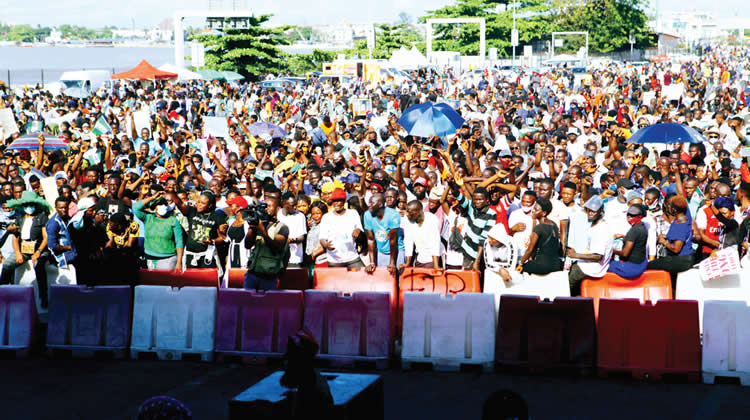LAGOS State is counting the cost of the recent #EndSARS violence. The governor, Babajide Sanwo-Olu, said it was “the most widespread carnage Lagos has seen in decades”, adding that the violence has set the state’s economy back by “tens of billions of naira”. Of course, the violence – any violence – is deeply regrettable, and one’s heart must go to the victims. Yet, truth is, it was utterly avoidable.
Nigeria, unlike many other countries, is not prone to violent demonstrations, even though there is a time-bomb waiting to explode. That time-bomb is a corrupt political system that breeds mass poverty and misery. And all that is needed to ignite it is direct government oppression. Those two factors – a time bomb waiting to explode and state violence to ignite it – were present in the #EndSARS riots.
In Lagos, the time-bomb is a corrupt political system, which creates huge economic inequality and breeds youths stunted by desperation and hopelessness. But while the betrayal and alienation of the youths by Lagos politicians was the underlying anger that fuelled the riots, the proximate trigger was the Lekki shootings – a blatant display of brute state force! Well, let’s address the trigger – the state violence – first.
For two weeks, the #EndSARS protests went on peacefully. The youths were hailed around the world for venting their raw rage in a non-violent manner. It was not until soldiers fired on peaceful protesters at the Lekki Toll Gate, reportedly killing about 12 people, that violent riots broke out in Lagos.
Thus, without the “Lekki massacre” on October 20, there might not have been the Lagos riots. Therefore, the first question the Lagos Judicial Panel must address is: Who ordered soldiers to open fire on the peaceful protesters?
Sadly, that basic fact may not be known. Already there are claims and counterclaims. The governor denied responsibility for the Lekki shootings, blaming forces beyond his control. But earlier this week, a spokesman for the Nigerian Army, General Ahmed Taiwo, described Sanwo-Olu’s denial as a “lie”, saying the governor invited the army to intervene.
Well, whoever invited the army, what’s clear is that the order to shoot came from above. Which is why it is sad, if not surprising, that President Muhammadu Buhari shows little remorse about the brutal military crackdown.
Earlier this week, Buhari’s spokesman, Femi Adesina, made a statement that must rank among the most thoughtless in history. “If President Buhari hadn’t exercised the restraint and tolerance of a father”, Adesina said, “we would have been talking of something else in the country”, adding: “The rivers of Nigeria could have turned crimson, and mourning and lamentation would have suffused the land.” Was he speaking for President Buhari? It’s shocking beyond belief!
But Buhari gave credence to the statement when he reportedly said this week: “I won’t allow a repeat of #EndSARS protests in Nigeria.” Taken together with Adesina’s macabre statement, Buhari’s vow is deadly ominous. What does he mean by “I won’t allow …”? A generous interpretation is that President Buhari would forestall such protests in the future through proactive engagement and dialogue.
But if that interpretation is wrong, then we must brace ourselves for maximum use of force to suppress such protests in the future. Yet, as we have seen with the Lekki shootings, such state violence would ignite more time-bombs that have been waiting to explode in this country.
Which brings me back to the Lagos time-bomb. Some historians might think of the Lagos riots, both in its intensity and targets, and draw parallels with the People’s Revolt in Texas in 1890, which was triggered by a corrupt political system that concentrated vast wealth in the hands of few and made poverty the fate of many.
Truth is, the political system in Lagos State in which those connected with the government are rich, while the vast majority of ordinary people are poor will sow the seed of suppressed anger and discontent, which only need some triggers, such as the Lekki shootings, to burst into the open.
Let’s face it, Lagos State is a strange political entity. Controlled by one party since 1999, it is run like a closed shop. A commentator, Kayode Ogundamisi, who knows the Lagos State governing party, All Progressives Congress, APC, well once wrote about the “mafioso nature” of the party.
He said that “Lagos State civil service is an extension of the party structure”, adding that “hardly would you find a Lagos State civil servant who is not a card-carrying member of the party.” He went to say that “Lagos APC has political leaders who depend on state resources.”
But what about those who don’t have access to state resources and are not politically connected? Well, they live in slums, are jobless, have no access to basic amenities. Truth is, hardly any policy of the Lagos State government, since 1999, has been aimed at tackling poverty, inequality and social degradation.
Lagos State APC politicians call themselves “progressives”, but true progressivism is about improving the human condition. That was Chief Obafemi Awolowo’s progressivism, aimed at liberating the human mind and enhancing social progress. But the progressivism of Lagos APC politicians is about self-enrichment through the state.
Think of the bizarre pensions scheme under which former Lagos State governors are entitled to a house each in Lagos and Abuja, six new cars every three years, 100 per cent of the basic salary of the serving governor, not to mention countless domestic allowances. The current government wants to abolish the scheme. Great! But think of the optics, let alone the substance. It betrays an utterly corrupt political system which enriches few and impoverishes many.
Most of the “many” are the youths. The Lagos riots exposed their rage against a self-interested political elite that lives in a bubble. But the riots should be a wake-up call. Youth poverty is always a time bomb waiting to explode. It must be defused, and not detonated with state violence!
Vanguard






Leave a Reply